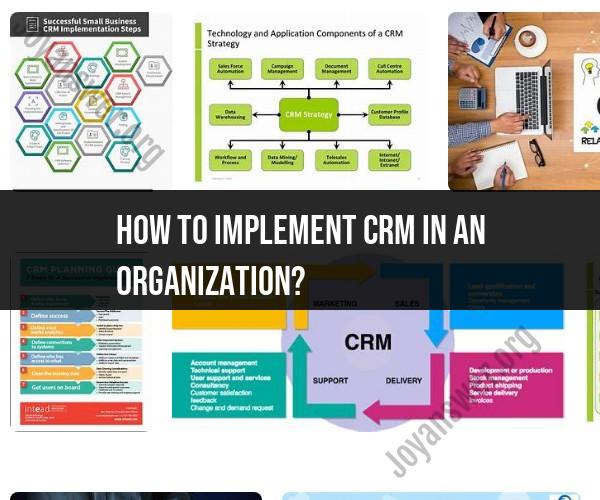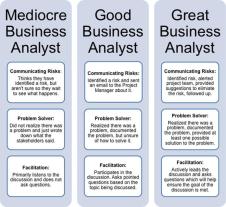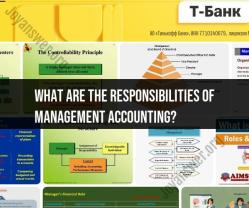How to implement CRM in an organization?
Implementing Customer Relationship Management (CRM) in an organization involves a structured process and best practices to ensure a successful rollout. CRM systems are valuable tools for managing customer interactions and enhancing relationships. Here's a step-by-step guide on how to implement CRM in your organization:
1. Define Clear Objectives:
- Start by defining specific and measurable objectives for implementing CRM. What do you want to achieve? Common goals include improving customer service, increasing sales, and streamlining processes.
2. Get Stakeholder Buy-In:
- Ensure that key stakeholders, including senior management, sales teams, marketing teams, and customer service representatives, are aligned with the CRM implementation. Their support and involvement are crucial.
3. Select the Right CRM Solution:
- Choose a CRM system that aligns with your organization's needs and objectives. Consider factors like scalability, integration capabilities, ease of use, and cost. Cloud-based CRM solutions are popular due to their flexibility.
4. Customize and Configure:
- Tailor the CRM system to meet your specific requirements. Customize fields, workflows, and reporting to align with your business processes. Ensure that the CRM captures the data you need.
5. Data Migration and Cleansing:
- Clean and migrate existing customer data into the CRM system. Accurate and up-to-date data is essential. Develop data quality standards and practices to maintain clean data over time.
6. Training and Education:
- Provide comprehensive training to all users who will interact with the CRM system. Ensure they understand how to use the CRM effectively for their roles. Training should be an ongoing process.
7. Pilot Testing:
- Conduct a pilot test with a small group of users to identify any issues or areas for improvement. Address any issues and refine processes before rolling out the CRM to the entire organization.
8. Integration with Existing Systems:
- Ensure that the CRM system integrates seamlessly with other existing software and systems, such as email, marketing automation, and ERP systems. Integration enhances data flow and efficiency.
9. Define Workflows and Automation:
- Map out your organization's customer processes and define workflows within the CRM system. Implement automation where possible to streamline repetitive tasks.
10. Monitor and Measure:- Continuously monitor the CRM system's performance and user adoption. Use key performance indicators (KPIs) to measure progress toward your objectives. Adjust and refine processes based on data and feedback.
11. User Feedback and Improvement:- Encourage users to provide feedback on their CRM experience. Use this feedback to make necessary improvements and enhancements to the system.
12. Data Security and Compliance:- Ensure that customer data is secure and compliant with relevant data protection regulations. Implement access controls and encryption to protect sensitive information.
13. Change Management:- Recognize that CRM implementation involves a change in how your organization operates. Effective change management strategies, including communication and training, are essential to overcome resistance to change.
14. Ongoing Support:- Provide ongoing technical support and a helpdesk for CRM users. Address issues promptly to minimize disruptions to daily operations.
15. Celebrate Success and Recognize Achievements:- Celebrate milestones and achievements along the CRM implementation journey. Recognize and reward teams and individuals who contribute to the system's success.
Successful CRM implementation is an ongoing process that requires commitment and continuous improvement. By following these steps and considering these key best practices, organizations can harness the full potential of CRM to enhance customer relationships, drive growth, and improve operational efficiency.
Implementing CRM in Your Organization: A Step-by-Step Guide
Here is a step-by-step guide to implementing CRM in your organization:
- Define your goals. What do you want to achieve with CRM? Do you want to improve customer satisfaction, increase sales, or reduce costs? Once you know your goals, you can develop a plan to achieve them.
- Choose the right CRM system. There are many different CRM systems available, so it is important to choose one that is right for your business. Consider the size of your business, your industry, and your budget when choosing a CRM system.
- Get buy-in from your team. It is important to get your team on board with the CRM system from the very beginning. Explain the benefits of the system and how it can help them to be more successful.
- Configure the CRM system. Once you have chosen a CRM system, you need to configure it to meet the needs of your business. This includes setting up user accounts, customizing fields, and creating workflows.
- Migrate your data. If you are already using a CRM system, you will need to migrate your data to the new system. This can be a complex process, so it is important to work with a qualified CRM consultant.
- Train your team. Once the CRM system is configured and your data has been migrated, you need to train your team on how to use the system. Make sure that they understand the benefits of the system and how it can help them to be more successful.
- Launch the CRM system. Once your team has been trained, you are ready to launch the CRM system. Be sure to monitor the system closely and provide support to your team as needed.
CRM Integration Roadmap: How to Successfully Implement in Your Organization
Here is a CRM integration roadmap for successful implementation in your organization:
- Assess your current state. This includes understanding your current business processes, systems, and data.
- Define your goals. What do you want to achieve with CRM integration? Do you want to improve customer experience, increase sales, or reduce costs?
- Choose the right CRM integration platform. There are many different CRM integration platforms available, so it is important to choose one that is right for your business. Consider the size of your business, your industry, and your budget when choosing a CRM integration platform.
- Plan your integration. This includes identifying the systems and data that you need to integrate, as well as the steps that you need to take to implement the integration.
- Implement the integration. This includes working with the CRM integration platform to implement the integration plan.
- Test the integration. Once the integration is implemented, you need to test it thoroughly to make sure that it is working properly.
- Deploy the integration. Once the integration is tested and working properly, you can deploy it to your production environment.
CRM Adoption Excellence: Implementing Customer Relationship Management
Here are some tips for CRM adoption excellence:
- Get executive buy-in. CRM implementation is a strategic initiative, so it's important to get the support of senior management. Make sure they understand the benefits of CRM and are committed to its success.
- Create a project plan. A well-defined project plan will help you stay on track and avoid pitfalls. Be sure to include a timeline, budget, and list of key tasks.
- Choose the right team. Assemble a team of experienced and knowledgeable people to help you implement CRM. This team should include representatives from sales, marketing, customer service, and IT.
- Communicate with your team and stakeholders. Keep your team and stakeholders informed of your progress and any changes to the plan. This will help ensure everyone is on the same page and working towards the same goals.
- Test and train. Before you launch the CRM system, be sure to test it thoroughly and train your team on how to use it. This will help ensure a smooth transition and minimize disruption to your business.
- Provide support. Once the CRM system is launched, be sure to provide support to your team as needed. This includes offering training, answering questions, and troubleshooting problems.
By following these tips, you can increase your chances of success when implementing a CRM system.













